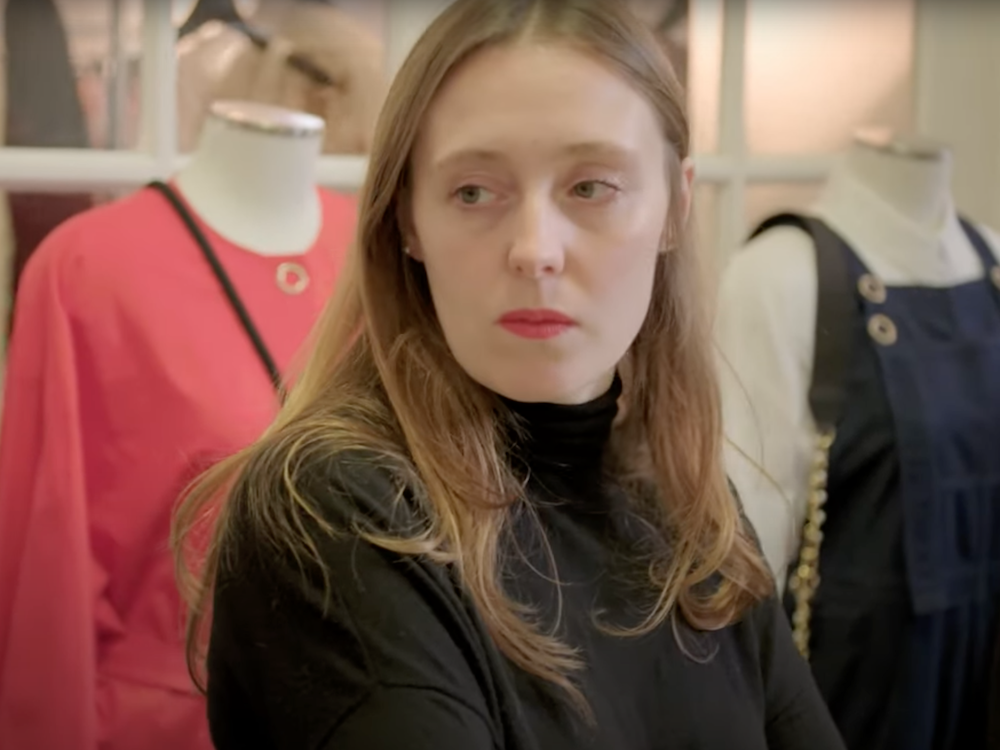Fashion might not seem the most obvious way to remake the world. But sometimes the best path to substantive change is to simply set forth and insist that there must be another way. And that is exactly what British designer Amy Powney does in Fashion Reimagined, a new documentary about how to do things differently.
With her gentle eyes, lanky hair and soft-spoken manner, Powney might not resemble a world-shaker. But she possesses a will of tensile steel and a powerful determination to change fashion from within.
She came by her convictions early. Raised in a caravan without heat, electricity or running water in northern England, Powney was bullied as a kid for her cast-off clothes and odd upbringing. But these elements became the fundaments of her eventual career in fashion. An encounter with Naomi Klein’s book No Logo also set the course for her approach to design.
After studying fashion at Kingston University London, Powney started a job at the design label Mother of Pearl, working her way up from shop assistant to creative director. In 2017, she received the Vogue Young Designer of the Year Award. Powney decided to use her prize money to create an entirely sustainable collection called No Frills (no connection to the Canadian supermarket chain of the same name). As the line’s marketing copy explains, the notion was to make clothes with “the minimum carbon footprint, minimum chemicals, social responsibility, respect for animals and focusing on natural fibres.”
From there, the film takes off, as Powney and her fellow Mother of Pearl colleague Chloe Marks circumnavigate the globe, sourcing not only the raw materials of clothing like wool and cotton, but also looking for ways to turn suppliers into allies in the quest to create ethically sourced and made clothing.
Powney jots her commitments down in a notebook. They fall into separate but related considerations and categories, including animal welfare, organically grown and harvested materials, and the least amount of transportation possible. On paper, it all looks pretty reasonable. But the actual world is never quite that amenable or straightforward.
The pair of women set off, undaunted by the scale of their project. At first things seem to work out well. They discover Pedro Otegui’s sheep ranch in Uruguay that harvests wool in a humane way. Unfortunately, there are no mills that can process the raw wool in the country. At first, it looks like neighbouring Peru might offer a solution, but the way in which the manufacturing and processing systems are set up, there is no direct path between the wool and the mill without first shipping it halfway across the world to China.
As Powney explains at the outset of the film, the fashion industry ranks third, behind the United States and China, as the world’s largest polluter. Fast-fashion retailers like Shein, Zara and H&M have massively shifted an already exploitive and wasteful system into something that approaches near-apocalyptic proportions.
The stats are trotted out at the beginning of the film like the march of doom. Not only for the level of pollution generated, but also the human cost that makes the garment industry one of the dirtiest and most nefarious.
Garment workers, largely women in poorer countries like Bangladesh, are woefully underpaid and forced to work in brutal conditions. None of this is new information, but what Fashion Reimagined does best is reveal the intricate networks of global supply chains, how they function or don’t — and how to disrupt the system. Sometimes all it takes is one person to do things differently.
Director Becky Hunter keeps the action moving at a brisk pace, packing in not only Powney’s personal story, but also explaining how things have changed, as the concepts of circularity, transparency, sustainability and other means of shaping the industry for the better have come into effect since Mother of Pearl’s initiative.
Even as the planet trembles on the verge of collapse, any trip to the mall or department store reveals that, on the ground, people have not changed their habits very much, if at all. The great shop-till-you-drop continues apace.
We, and I include myself, buy three times as many clothes as we did four decades ago, and a great many of these articles end up in landfill within a year. People have been trained, and trained hard, to be shoppers. So dialling this back to more reasonable levels of consumption hasn’t worked all that well.
To make people alter their habits takes more than finger-wagging and lectures. Pleasure must be involved as well. To that end, this is an extremely toothsome film, beautifully shot from beginning to end. Anyone with the least interest or hankering for tactile stuff — jacquard fabrics, luscious wool, crisp cotton — will be enthralled by the many sequences of cloth in the midst of being produced.
As the narrative makes clear, fashion is still very much an industry. Although making products in a more ethical way is a step forward, it still requires considerable resources.
The ultimate solution is to buy as little as possible. To this end, Mother of Pearl establishes a series of pledges for its supporters during London Fashion Week, wherein folk can lend their support to a variety of different options such as buying no new clothes for a year, shopping only in second-hand stores and supporting women garment workers.
One of the stickier issues that the film gives a gentle nod to, but fails to fully tackle, is the price point associated with sustainability. In a rather sad sequence, after travelling around the world to find materials and suppliers, Powney displays her new collection at an event for fashion buyers in Paris. Stylish folk waft in and out, looking none too excited and a few remarking that the price is simply too high for the average shopper.
But Powney has the courage of her convictions. Success comes in dribs and drabs, then in a flood. While Mother of Pearl’s commitment was initially something of an outlier when Powney first embarked on her quest in 2017 and 2018, things have changed significantly since. The number of brands and designers that have embraced the idea of finding better ways of making clothes has expanded exponentially, with everything from mushroom leather to lyocell entering the marketplace.
Powney has also been busy, birthing a couple of babies, writing a column for British Vogue, and continuing to design for Mother of Pearl.
While this one initiative won’t solve all the problems associated with fashion, it is a timely reminder that one person, if sufficiently determined, can have an enormous impact.
After watching the film, I immediately went to the Mother of Pearl website to have a look at their offerings. Put your money where your mouth is. Also, outfit your butt in clothes that have the least destructive impact on the poor old planet. That’s pretty stylish stuff.
‘Fashion Reimagined’ is screening at the Vancity Theatre in Vancouver until July 2. ![]()
Read more: Labour + Industry, Film, Environment
















Tyee Commenting Guidelines
Comments that violate guidelines risk being deleted, and violations may result in a temporary or permanent user ban. Maintain the spirit of good conversation to stay in the discussion and be patient with moderators. Comments are reviewed regularly but not in real time.
Do:
Do not: